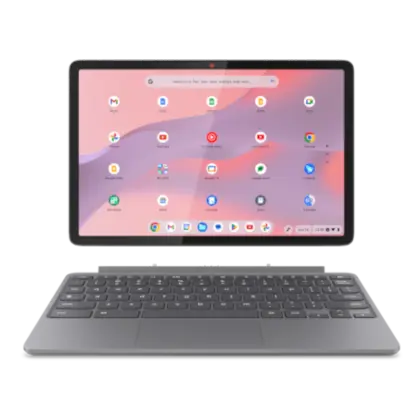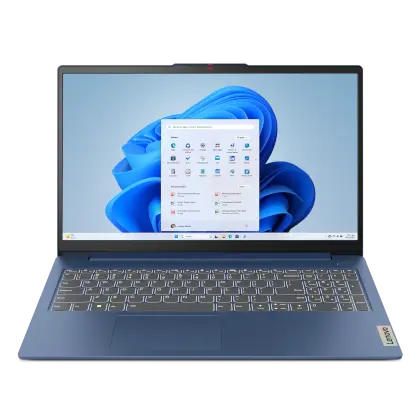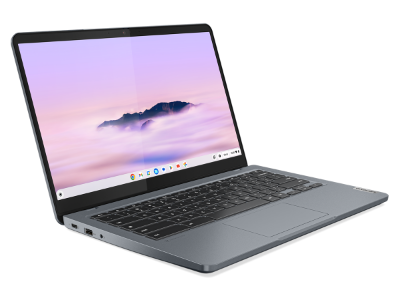33 Matching results
-
$539.99
Lenovo® USI Pen 2 included
Price Match GuaranteePart Number 83HH0001USFeaturesThin, light, & portable
Versatility that suits all settings
2K display & sharp audio
Key Details- Processor : MediaTek Kompanio 838 Processor (2.60 GHz )
- Operating System : Chrome OS
- Graphic Card : Integrated ARM Mali-G57 MC3 GPU
- Memory : 8 GB LPDDR4X-4266MT/s (Soldered)
- Storage : 128 GB eMMC 5.1 TLC
- Display : 10.95" WUXGA (1920 x 1200), IPS, Glare, Touch, 72%NTSC, 400 nits, 60Hz, Glass
- Warranty : 1 Year Courier or Carry-in
See MoreSee Less -
Est Value $904.99$649.9928% offPrice Match GuaranteePart Number 83E60001USFeatures
Smooth performance with abundant storage
Audiovisual treat including smart technology
Rugged build, maintains privacy, highly secure
Key Details- Processor : Intel® Core™ 3 100U Processor (E-cores up to 3.30 GHz P-cores up to 4.70 GHz)
- Operating System : Windows 11 Home 64
- Graphic Card : Integrated Intel® Graphics
- Memory : 8 GB DDR5-5200MHz (Soldered)
- Storage : 512 GB SSD M.2 2242 PCIe Gen4 TLC
- Display : 15.6" FHD (1920 x 1080), IPS, Anti-Glare, Touch, 45%NTSC, 300 nits, 60Hz, Narrow Bezel
- Warranty : 1 Year Courier or Carry-in
See MoreSee Less -
$734.99Price Match GuaranteePart Number 83BN001AUSFeatures
Sleek 14″ Chromebook for work, study, & play
Intel processors fuel efficient multitasking
Military-grade durability
Key Details- Processor : Intel® Core™ i3-N305 Processor (1.80 GHz up to 3.80 GHz)
- Operating System : Chrome OS
- Graphic Card : Integrated Intel® UHD Graphics
- Memory : 8 GB LPDDR5-4800MT/s (Soldered)
- Storage : 128 GB eMMC 5.1 TLC
- Display : 14" FHD (1920 x 1080), IPS, Anti-Glare, Touch, 100%sRGB, 300 nits, 60Hz, Narrow Bezel, LED Backlight
- Warranty : 1 Year Courier or Carry-in
See MoreSee Less -
Est Value $1,004.99$764.9923% offPrice Match GuaranteePart Number 83E6000AUSFeatures
Smooth performance with abundant storage
Audiovisual treat including smart technology
Rugged build, maintains privacy, highly secure
Key Details- Processor : Intel® Core™ 5 120U Processor (E-cores up to 3.80 GHz P-cores up to 5.00 GHz)
- Operating System : Windows 11 Home 64
- Graphic Card : Integrated Intel® Graphics
- Memory : 8 GB DDR5-5200MHz (Soldered)
- Storage : 512 GB SSD M.2 2242 PCIe Gen4 TLC
- Display : 15.6" FHD (1920 x 1080), IPS, Anti-Glare, Touch, 45%NTSC, 300 nits, 60Hz, Narrow Bezel
- Warranty : 1 Year Courier or Carry-in
See MoreSee Less
Is an 8 GB RAM laptop sufficient for my needs?
Choosing a new laptop is exciting, but it can also be a daunting prospect if you are not familiar with all the different specifications. One of the most seen specifications is an 8GB RAM laptop. But what does that mean, and is 8GB RAM enough for a laptop for you?
RAM (which stands for Random Access Memory) is essential to keeping your laptop’s operating system and software programs running properly. It’s where your PC stores the most frequently used data so it can be accessed and modified as needed – and at lightning speed. Whether it’s a key part of your OS, the web browser or software programs you’re using, or the active data you’re working with (the contents of a document or spreadsheet, for example), it’s all stored in RAM for near-immediate processing.
This makes your decision regarding RAM a “balancing act.” You want enough RAM to meet your needs while keeping the price of your new PC affordable. Fortunately, it’s a great time for RAM buyers. Prices have been trending down as the competing demand for RAM chips for smartphones (where sales are slowing) has lessened. With this in mind, when shopping for a new laptop, don’t hesitate to look at models with the next increment of RAM – if you think you can only afford a laptop with 4 GB, be sure to look at models with 8 GB of RAM. The price difference could be less than you expect.
As a rule of thumb, it is worth buying the best laptop your budget will allow. A cheap 8GB RAM laptop may be all you need today. But if you are thinking of using your computer for gaming or even processing large image files, it is worth looking at the top end. Consider a 16GB RAM laptop instead.
Between these two extremes, there are plenty of options including 8GB DDR3 laptop RAM and 8GB DDR4 RAM for laptops. Here are the pros and cons.
Deciding how much RAM you need
Here are some additional factors to consider when deciding how much RAM you need in a new laptop:
· OS-related RAM needs: Even when you’re not streaming a movie or crunching numbers, the Windows 10 OS can consume from 2-3 GB of RAM just to keep your system running. It’s easy to see why a laptop with a RAM size of just 4 GB can’t match the performance of one with 8 GB of RAM or more.
· RAM speed: RAM can be fast or slow relatively speaking, and faster RAM speed can help make up for a smaller allotment of RAM. This means that in addition to looking at the volume of RAM, you can look for today’s fastest RAM, either DDR3 or, preferably, DDR4.
· RAM to support system components: Other system components can affect how your laptop uses its RAM. For example, discrete graphics cards (GPUs) have their own memory to store the data needed to display rapidly changing, on-screen imagery. Systems with integrated graphics rely on your main RAM module to store this data, reducing the memory available for other tasks.
Still not sure if 8 GB of RAM is sufficient for your new laptop? One often-cited way to decide is consider how you’ll use your new PC, list the most demanding software or game titles you expect to use, and consult the manufacturers’ websites to determine their “recommended” RAM specifications. It’s best to ignore the “minimum” system standards, which often assume you won’t be running any other programs at the same time (highly unusual for today’s multi-taskers).
What can I do with an 8 GB memory laptop?
Every PC buyer eventually faces the question “How much (or memory) should I buy?” If you’re shopping on a budget, you’ll see many models with just 4 GB – the bare minimum RAM size for most systems today. On the high end, you’ll find built-for-speed gaming rigs and workstations with large RAM allotments of 16-32 GB. Yet what about all the models you see listed with 8 GB? Is 8 GB of RAM enough to keep your new laptop running smoothly?
The short answer is yes, a laptop with 8 GB of RAM is a logical choice for everyday personal computing: business and office work, web research and word processing, family activities such as email and video streaming – even mainstream PC gaming. It won’t run the most demanding Virtual Reality and first-person combat games, and it will be slow for advanced video editing or CAD drawing. Experts will tell you that a laptop with 8 GB of RAM sits squarely in the “sweet spot” for most consumers – an ideal balance of price and performance.
If you are not looking for extreme performance, an 8GB RAM laptop will suit your needs and be kind to your budget. Staying in the “sweet spot”, one of the most popular combinations you will come across is a laptop i5 8GB RAM. The specification i5 refers to the laptop’s processor, where the “i” stands for manufacturer Intel. The number 5 specifies the series of processors.
What does this mean for your 8GB RAM laptop? The laptop i5 8GB RAM specification combines sufficient memory with a high-performing processor. Later generations, like i7 and i9, are faster and more powerful. But they also require more power and may shorten battery life.
Another “sweet spot” combination is a laptop 8GB RAM 256GB SSD. SSD stands for solid-state drive; it’s the amount of permanent storage built into your laptop. Most laptops and PCs will have either 128GB or 256GB. Generally speaking, you need 15-25% of empty space to allow your computer to run well. If you are filling your storage, it will slow down your computer. This is why it’s worth buying a laptop with 8GB RAM and 256GB SSD rather than one limiting you to 128 GB SSD. Of course, another option is to store large media files in the cloud.
Alternative specifications: what about DDR3 and DDR4?
Two more specifications you will find when looking for a cheap 8GB RAM laptop are DDR3 and DDR4. DDR stands for double data rate, which is another type of memory.
Current choices include 8GB DDR4 RAM for laptops and 8GB DDR3 laptop RAM. The main differences between the two generations of memory are speed and energy use. DDR3 was launched in 2007, and DDR4 followed suit in 2014. Since 2017, new platforms have been using DDR4 only.
So, why do you still find DDR3 RAM laptop 8GB specifications? Because these laptops are powerful enough for most home users, and they have a very attractive price point. In most cases, the type of DDR your new 8GB RAM laptop will use is defined by the motherboard. Connections as DDR3 are different from DDR4. As a result, there is no option to switch between the two.
If you are planning to use your laptop for several years, it is worth choosing 8GB DDR4 RAM for your laptop. Just like DDR3 replaced DDR2, DDR4 will eventually make its predecessor obsolete. If you are considering a DDR3 RAM laptop 8GB specification, you need to be aware of this. Purchasing a laptop with the latest-generation components is a more future-proof choice.
Is more RAM always better?
Is 8GB RAM enough for a laptop or should you look at the top end and choose a 32GB RAM laptop? For most home users, an 8GB RAM laptop delivers excellent value for money.
However, there are some exceptions to this rule. If you are a serious gamer or a serious (amateur) digital photographer, for example, you may want to consider higher-end specifications. Gaming laptops have long used faster, better-performing processors and larger amounts of memory.
Media files are another consideration. As digital cameras continue to accommodate higher quality images and video, they also produce larger files. Editing those files can put a strain on a cheap 8GB RAM laptop. A few years ago, this was only a concern for a handful of digital filmmakers. Today, even small action cameras deliver high-quality video which requires more substantial computing capacity.
Choosing the best 8GB RAM laptop for you does not need to be difficult. Most people will be limited by budget considerations, and it is perfectly possible to purchase a high-quality, yet cheap 8BG RAM laptop. Opting for a specification of laptop i5 8GB RAM will suit most home users. While not everyone needs high speed and processing performance for large files, it is a good idea to buy the best laptop you can afford. This strategy ensures that your laptop will suit you for years to come.
Which laptop is best with 8GB RAM?
If you're looking for a powerful laptop that can handle any task you throw at it, then you'll want to look at a laptop with 8GB of RAM. These laptops are great for gaming, video editing, or any other resource-intensive activity as well as everyday tasks like browsing the web and watching videos.
Is 8GB RAM enough for Windows 11?
8GB of RAM is enough to run Windows 11, but it may not be sufficient for more demanding tasks. If you plan on running resource-intensive applications or games, you may want to consider upgrading your RAM. Otherwise, 8GB should be plenty to handle most everyday computing needs.
Is 8 GB RAM enough for student laptop?
8 GB RAM is a good amount of memory for most students' laptops. It is enough to run multiple programs at once and can handle light gaming
Is 8GB RAM enough for laptop?
The short answer is: yes, 8GB RAM is enough for a laptop. Sure, there will always be power users who need more RAM, but for the average user, 8GB RAM will be more than enough. Power users can always upgrade to a higher-end laptop with more RAM. But for the average user, 8GB RAM will be plenty.
Is 8GB RAM enough for working from home?
For most people who work at home, 8GB of RAM will be plenty for basic tasks like browsing the web, checking email and streaming video However, if you're running multiple programs at once or working with larger files, you may need more RAM.
Is 8GB RAM enough for college student?
As a college student, you'll need a laptop that can handle all your schoolwork and other activities. 8GB of RAM should be enough for most students, but if you're planning on using resource-intensive programs or working with large files, you may want to consider a laptop with more RAM.


Consumers Only: Lenovo.com sells and ships products to end-user customers only. Lenovo may cancel your order if we suspect you are purchasing products for resale.
Limits: Limit 5 per customer. Offers valid from Lenovo in the US only. Lenovo may increase or decrease these limits, from time to time, for certain offerings.
Ship date: Shipping times listed are estimates based on production time and product availability. An estimated ship date will be posted on our order status site after your order is placed. Ship dates do not include delivery times which will vary depending on the delivery method selected at checkout. Lenovo is not responsible for delays outside of our immediate control, including delays related to order processing, credit issues, inclement weather, or unexpected increase in demand. To obtain the latest information about the availability of a specific part number, please call the phone number listed in the masthead at the top of this page.
Same Day Shipping: Products ship within the same business day (excl. bank holidays and weekends) for orders which have been placed prior to 3pm ET and which are prepaid in full or payment approved. Limited quantities are available. Software and accessories will be shipped separately and may have a different estimated ship date. Same day shipping may not be available for some orders placed with Lenovo Financing and Katapult payment options.
Availability: Offers, prices, specifications and availability may change without notice. Lenovo will contact you and cancel your order if the product becomes unavailable or if there was a pricing or typographic error. Products advertised may be subject to limited availability, depending on inventory levels and demand. Lenovo strives to provide a reasonable quantity of products to accommodate estimated consumer demand.
General: Review key information provided by Microsoft that may apply to your system purchase, including details on Windows 10, Windows 8, Windows 7, and potential upgrades/downgrades. Lenovo makes no representation or warranty regarding third-party products or services.
Trademarks: IdeaPad, Lenovo, Lenovo Legion, ThinkPad, ThinkCentre, ThinkStation, Yoga, the Lenovo logo and the Lenovo Legion logo are trademarks or registered trademarks of Lenovo. Microsoft, Windows, Windows NT, and the Windows logo are trademarks of Microsoft Corporation. Ultrabook, Celeron, Celeron Inside, Core Inside, Intel, Intel Logo, Intel Atom, Intel Atom Inside, Intel Core, Intel Inside, Intel Inside Logo, Intel vPro, Itanium, Itanium Inside, Pentium, Pentium Inside, vPro Inside, Xeon, Xeon Phi, and Xeon Inside are trademarks of Intel Corporation or its subsidiaries in the U.S. and/or other countries. Other company, product or service names may be trademarks or service marks of others.
Warranty: For a copy of applicable warranties, write to: Lenovo Warranty Information, 1009 Think Place, Morrisville, NC, 27560. Lenovo makes no representation or warranty regarding third party products or services. The Lenovo Limited Warranty applies only to Lenovo hardware products purchased for your own use, and does not transfer upon resale.
Battery: These systems do not support batteries that are not genuine Lenovo-made or authorized. Systems will continue to boot, but may not charge unauthorized batteries. Attention: Lenovo has no responsibility for the performance or safety of unauthorized batteries, and provides no warranties for failures or damage arising out of their use. Battery life (and recharge times) will vary based on many factors, including system settings and usage.
Pricing: Does not include tax, shipping and handling, or recycling fees. Reseller prices may vary.







